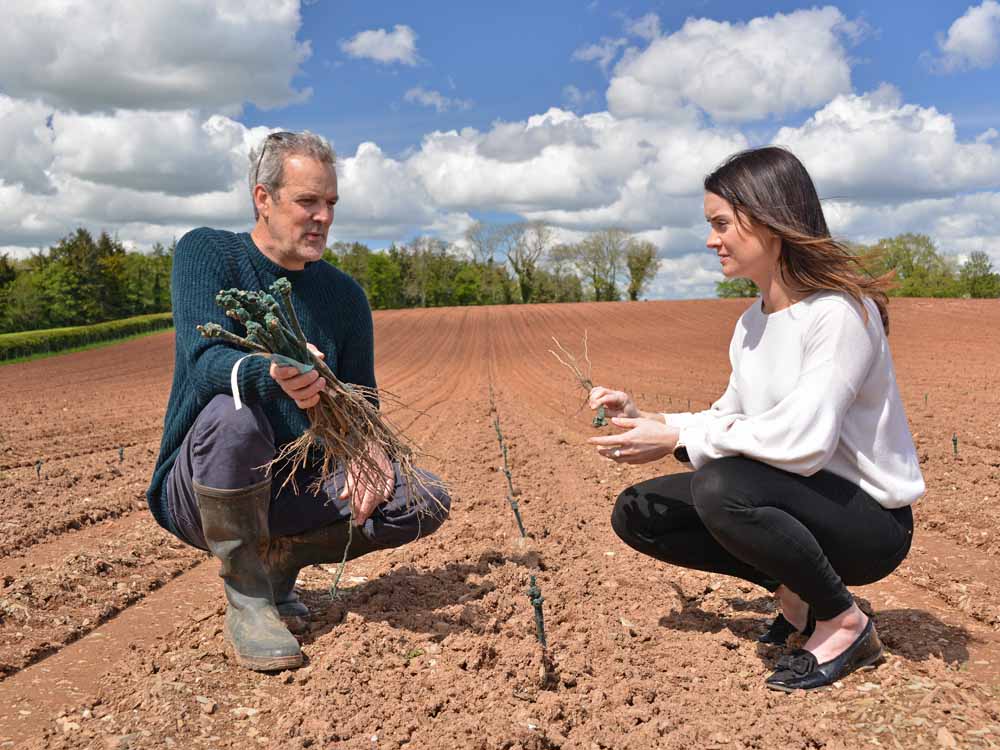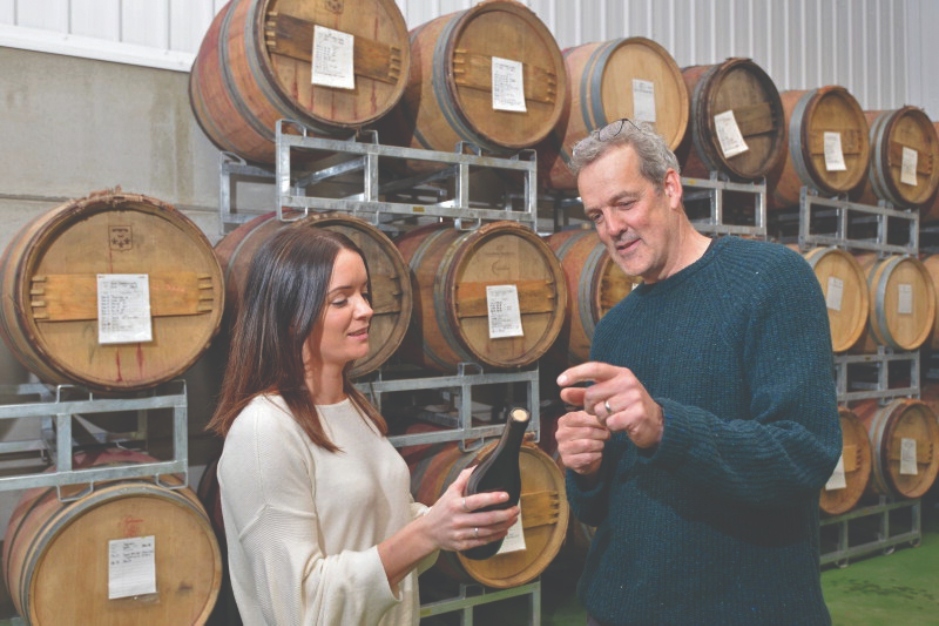A Devon vineyard plans for a sustainable future
Sustainability lies at the heart of ambitious future plans for a Devon wine producer. The Rural Report journeys to the south west to discover more and find out how Knight Frank is helping with the transformation.
5 minutes to read
I first visited the picturesque 405-acre Sandridge Barton estate on the banks of the River Dart, and its newly established vineyard, almost a decade ago. Since then, much has changed and the original vision of owner Jane Moon and her husband Andrew is close to fruition.
Looking back at the article I wrote then for The Rural Report, all the estate’s grapes were sold to celebrated Dart Valley winemaker Sharpham Wine on the other side of the river. But I recall Jane telling me, as she proudly showed me around the vines, of her and Andrew’s dream that one day Sandridge Barton would be producing wine under its own name.
A change of strategy by the trust that owned the land and premises rented by Sharpham Wine, combined with the negotiating skills of Knight Frank’s Edward Dixon, who has been helping the Moons for more than ten years at Sandridge Barton, and the help of another of my colleagues, Elin Jones, means that dream is about to be realised.
The estate’s first own-label release is pencilled in for 2022.
A new winery, housed on the site of a former Agricultural Holdings Act tenanted dairy farm that Edward brought back in hand for the Moons, is already up and running, producing and bottling wine from the 2020 grape harvest under the Sharpham Wine brand. A visitor centre and café, housed in a converted traditional barn is due to open next spring. Vineyard safaris could also be on the menu.
Jane and Andrew had previously discussed joining forces with Sharpham Wine, but the decision by the business’s landlord not to renew its lease eventually made the decision for them. “It was quite a big step, but it made perfect sense to help us fulfil our ambition,” says Jane.
Chief winemaker Duncan Schwab – who first joined Sharpham Wine in 1992 and is one of the UK’s most experienced winemakers – and his team, along with all their winemaking equipment and Oak the winery dog, are now firmly ensconced in the new Sandridge Barton winery, which will be able to produce around 120,000 bottles of wine each year.
The move coincides with a surge in demand for a wider variety of home-grown wine, and a new seven-acre vineyard over a limestone ridge has also just been planted that will produce Pinot Noir variety grapes.
“Much of the wine produced in the UK has traditionally been sparkling white, but we can produce really good red wines here because of the soil and climate, so that’s an area where we want to expand,” explains Schwab, as he gives me a tour of his newly planted vines.

Above: Knight Frank's Elin Jones and head winemaker Duncan Schwab survey the newly planted vineyard at Sandridge Barton.
Sustainability
Another change for the business is a greater focus on sustainability throughout the winemaking process. “Climatic conditions make it very hard to grow grapes in the UK without using any chemicals, so we’re not going to cut them out overnight," says Schwab. “But we’ll be asking a lot more questions of ourselves and setting up trials to see what can work.
“We’ll be getting rid of insecticides – I can live with a few wasps – and using mechanical techniques or even sheep to control weeds around the vines. We will also be working with ecology students from the nearby Dartington Trust to help measure and track our levels of biodiversity.”
The winery itself is solar powered and supplied with water from its own spring. All the waste material from the winemaking process then goes through a bio-bubble digestor.
“We are very self-sufficient here,” points out Schwab. “We don’t want to just talk about doing good, we actually want to do it.”
Younger drinkers are increasingly interested in how their wine has been produced and there is growing demand for so called “living” or “natural” wines, says Schwab.
“To ensure consistency, a lot of big winemakers around the world will basically create something that they can strip down and rebuild to their exact specifications in terms of acidity and the like, but they are boring and sterile. Wines that are more natural have a lot more life to them. You may not be able to create exactly the same wine each year, but I don’t mind that. I’m happy to have a variety of vintages over different years.”

Above: The new winery will be able to produce 120,000 bottles a year.
Unsung heroes
I mentioned Elin Jones earlier, another crucial player in the transformation of Sandridge Barton from grape-growing estate to fully fledged winemaker and visitor attraction. Elin is a chartered accountant in Knight Frank’s Rural Asset Management team, who specialises in helping businesses manage change. Her role usually takes place, unsung, behind the scenes, but she is a crucial part of the process.
In the case of the Sandridge Barton expansion, Elin, who also helped the filmmaker and entrepreneur Guy Ritchie with his Gritchie Brewery project, introduced online accounting and reporting systems that helped with the integration of Sharpham Wine into the existing estate, as well as streamlining their wider financial systems.
“It is very useful to work with an advisor who can offer this level of service,” says Jane Moon. “A lot of rural consultants will have lots of good ideas, but aren’t always able to facilitate them and make them happen.”
As estates face a growing number of challenges, Elin tells me her role is becoming increasingly important. “You’d be amazed at how many rural businesses are still recording everything manually or with spreadsheets that don’t always capture a live picture. It makes it very difficult to react quickly to any new opportunities that may arise if you don’t have the right systems in place.”
The Covid-19 pandemic has also highlighted the importance of being properly connected, adds Elin. “With so many people working from home or remotely, it’s really crucial they all have easy access to the information they need. Without that, it’s very difficult to make sensible or informed decisions, particularly for owners like the Moons who live elsewhere for much of the time.”
After my first trip here a decade ago it’s been fascinating to revisit Sandridge Barton to see how the estate has developed. Given all the exciting plans, I’m going to make sure I come back a little bit sooner next time to sample a new era of Devon wine.